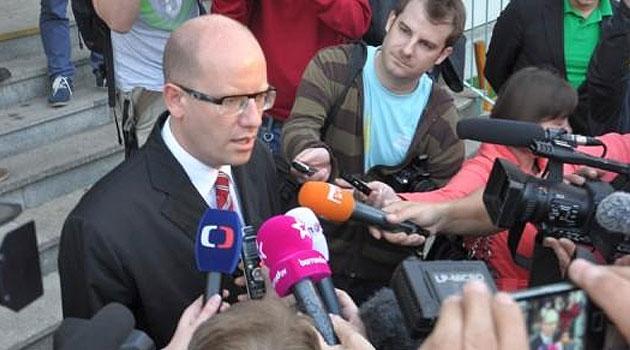Czech PM Sobotka does not want more homelessness, demands law be changed

"I am of the opinion that it is essential for the Labor Minister to respond by drafting another amendment to the law where we establish clear rules to prevent people from ending up on the street en masse who are not entitled to any state support," said Czech Prime Minister Bohuslav Sobotka after yesterday’s cabinet session. His remarks were made in response to the situation prompted by a recently-adopted amendment to the law on aid to those in material distress which means that as of May, applications for housing benefits filed by people living in residential hotels are approved by local authorities, not the state’s Labor Offices.
The amendment was intended as an instrument for combating "traffickers in poverty", but in several municipalities it has been used against the occupants of the residential hotels. The total numbers of approved and rejected applications are unknown, but in some towns the situation could be critical.
Human rights activist Kumar Vishwanathan estimates that in Bohumín and Ostrava alone, local authorities could reject as many as 2 200 applications, which means that as many as 7 000 people might end up on the street. Municipalities are approaching their assessment of these applications very differently: Some are rejecting applications across the board, like Bohumín and the Mariánské Hory Municipal Department of Ostrava (724 applications total).
Others are not assessing them at all, claiming they do not have enough information to do so, such as the Moravská Ostrava and Přívoz Municipal Department (247 applications) or Cheb (37) applications. By refusing to review them, of course, they are de facto rejecting them, because the approval of the municipality is required for the benefits to be awarded.
Other local councils are creating their own sets of criteria for assessing these applications that are either more or less favorable toward people seeking to live in residential hotels: The Ostrava-Jih Municipal Department, like several others, is requiring that applicants have permanent residency based on their territory and not have any outstanding debts toward the municipality, which of course are criteria that cannot be met by many applicants. Since more than 1 000 persons are requesting housing benefits in that municipal department alone, it would seem that Vishwanathan’s estimate is a realistic one.
The Ústí nad Labem town hall has also designed detailed criteria for assessing these applications, according to spokesperson Romana Macová, and those are expected to be definitively approved during the next few weeks. For the time being, Ústí has approved 454 applications, but only for periods ranging between one to three months.
In Karviná, spokesperson Šárka Swiderová says town councilors are requiring that an applicant’s permanent residency be based on their territory; the town still has to process approximately 300 applications for housing benefits. The wording about municipalities approving the benefits made it into the law because of an amendment proposed by Czech MP Zdeněk Stanjura.
The Czech Labor and Social Affairs Minister did not agree with the changes, but was unable to participate in the vote as she is neither an MP nor a Senator. Most of her colleagues from the Social Democrats and their coalition partners voted for the amendment (Czech Prime Minister Sobotka was excused from that vote).
The amendment was then later approved by a clear majority of Senators. Czech Human Rights Minister Jiří Dienstbier, who is also a Senator, abstained from that vote.